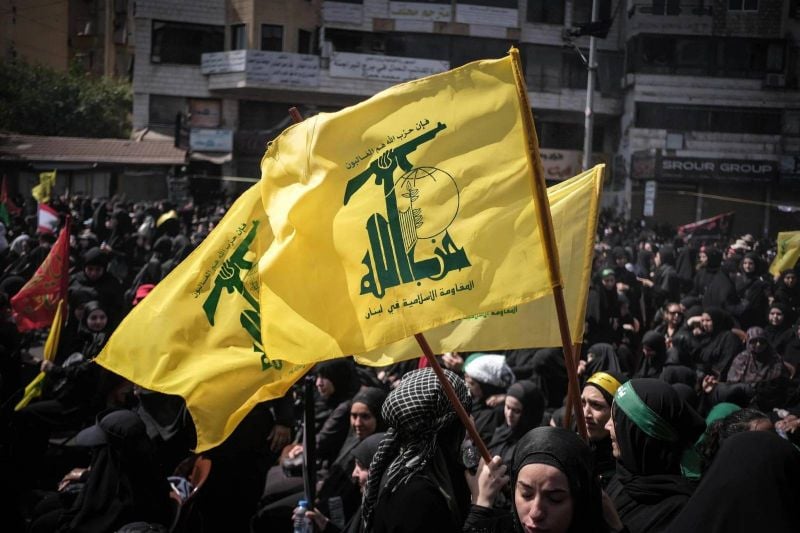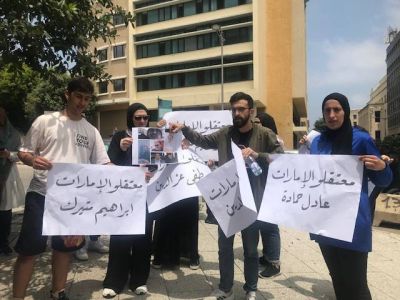
A gathering of Hezbollah supporters in Beirut in 2023. (Credit: João Sousa/L'Orient Today)
BEIRUT — The head of Hezbollah's liaison and coordination unit, Wafiq Safa, traveled to the United Arab Emirates (UAE) on Tuesday, a spokesperson for Hezbollah confirmed to L'Orient Today. The purpose of his visit, according to the political wing, is to negotiate the release of several Lebanese detainees currently held in Emirati prisons who are suspected of having ties to Hezbollah.
Safa's visit is both unexpected and unprecedented, as it marks the first time that a Hezbollah official has visited the Emirates in a official capacity.
"He is trying to secure a deal before the end of Ramadan," the spokesperson explained. She gave no further details.
Aboul-Fadl Chouman, a spokesperson for the relatives of the detainees in the UAE, told OT last July that six Lebanese citizens, including four who are serving life sentences and two who face 15 years in prison, remain incarcerated in the Emirates.
It is unknown what the legal process surrounding their detention entailed and whether they were represented by lawyers or provided with a fair trial.
According to Chouman, the UAE, which has designated Hezbollah a terrorist organization, is holding the Lebanese citizens under the charge of "laundering money for Hezbollah and Iran, as well as having made contact with the Shia party." Each of the accused have denied the allegations.
The issue gained renewed attention in May last year following the death of Lebanese businessman Ghazi Ezzeddine while in UAE custody, reigniting concerns about the fate of Lebanese citizens, predominantly Shiites, detained in recent years for suspected links to Hezbollah.
Almost two weeks later, the Emirates released nine Lebanese detainees who were arrested for their alleged links with Hezbollah.
Back in 2021, a dozen detainees returned to Lebanon in an agreement that was mediated by former General Security Chief Abbas Ibrahim and received great media attention.
However, many cases remain shrouded in ambiguity, with both Lebanese and UAE authorities reluctant to divulge details about the arrests. These detentions occurred against a backdrop of regional tensions and a persistent power struggle between Sunni Gulf monarchies and Shia Iran, despite tentative diplomatic overtures between Saudi Arabia and Iran initiated in March.
Hanin Ghaddar, Friedman Senior Fellow at the Washington Institute, told L’Orient Today that “the news indicates that it is about the Lebanese detainees in the UAE, but it could be about something else, or in addition to this.”
“It could be that the UAE is playing a mediation role to calm down the escalation in Lebanon, and negotiate a deal with Hezbollah, which still has to give certain guarantees for a cease-fire,” Ghaddar suggested.
“It could also be part of UAE-Iran talks that involve Lebanon. But Wafiq Safa has a very specific job that revolves around security matters in Lebanon, so I would say it might as well be about the detainees, with Hezbollah giving something in return – either to Israel, or in the Captagon smuggling problem.”
In 2021, diplomatic relations between Lebanon and the UAE became strained after then-Lebanese Minister of Information George Kardahi made inflammatory statements on a television program, broadcast on Oct. 27, 2021. He appeared to accuse Saudi Arabia and the UAE as the aggressors in the war in Yemen, prompting a diplomatic crisis between Lebanon and the Gulf countries.
Three days later, on Oct. 30 of that year, Saudi Arabia, Kuwait, the UAE and Bahrain announced they had severed diplomatic and trade relations with the Lebanese government. That same year, Saudi said it had intercepted 5.3 million tablets of the highly addictive amphetamine drug, Captagon, which was concealed in a shipment of grenades aboard refrigerated trucks from Lebanon.
However, in October 2023, relations took a more positive turn when an agreement was reached for the United Arab Emirates to reopen its embassy in Beirut, which had been closed since 2021.
Safa's visit comes as the war in Gaza, and the conflict between Hezbollah and Israel in southern Lebanon surges well into its sixth month. Since Oct. 8, the day after Hamas' assault on Israel, Hezbollah has been firing missiles at military targets in northern Israel. Israel, in return, has heavily bombarded villages and towns in southern Lebanon. At least 223 Hezbollah fighters have died in Lebanon, as well as 49 civilians.
Randa Slim, director of the Conflict Resolution and Track II Dialogues Program at the Washington-based Middle East Institute said on X that "while we should not read too much into the agenda for this visit, the fact that this visit is taking place and Safa is welcomed in Abu Dhabi are a major development. After all, Safa is a senior Hezbollah figure and not a Lebanese [government] official."
While we should not read too much into the agenda for this visit, the fact that this visit is taking place and Safa is welcomed in Abu Dhabi are a major development. After all, Safa is a senior #Hezbollah figure & not a Lebanese govt official. #Lebanon #UAE #Hezbollah https://t.co/yyMc6DnZdo
— Randa Slim (@rmslim) March 19, 2024
Safa the 'troubleshooter'
Safa is often described as Hezbollah's "troubleshooter" and plays a pivotal role in managing the organization's relationships with key Lebanese officials, including former President Michel Aoun and head of the Free Patriotic Movement Gebran Bassil. Safa also has close ties with former General Security chief Abbas Ibrahim, underlying his significant role in coordinating between Hezbollah and state security agencies.
In 2014, for example, then-Minister of the Interior Nouhad al-Machnouk invited Safa to join a senior-level meeting of security officials at the ministry to discuss the situation on the north-eastern border with Syria. The meeting exemplified the ongoing synergy between Hezbollah, the official security agencies, and the Lebanese armed forces.
In 2017, Ibrahim handled negotiations on behalf of Hezbollah for the return of its abducted fighters in Syria, and together, Ibrahim and Safa greeted the returnees at the border.
US sanctions on Safa
In 2019, Safa was sanctioned by the US Treasury of State along with Hezbollah MPs Mohammad Raad and Amin Cherri.
A official US sanctions document states that Safa "serves as a [Hezbollah] interlocutor to the Lebanese security forces."
"As the head of [Hezbollah's] security apparatus, which is directly linked to Secretary General Hassan Nasrallah, Safa has exploited Lebanon's ports and border crossings to smuggle contraband and facilitate travel on behalf of [Hezbollah], undermining the security and safety of the Lebanese people, while also draining valuable import duties and revenue away from the Lebanese government," the US treasury stated, claiming that this was one of the reasons he was sanctioned.
Reports received by the US also allegedly suggest Safa's involvement in various activities, including the 1983 bombing of the US Marine barracks in Beirut and "the kidnapping of foreign nationals for political leverage."
In a rare interview with Iran's state-news agency in September 2023, Safa explained why, during a public event, he had refused to shake hands with the head of the US Intelligence Officer in Lebanon. "Hezbollah believes that it cannot negotiate or cooperate with two entities: the Zionist enemy [Israel] and the US government," Safa said.
Hezbollah's Wafiq Safa Discusses Refusal to Shake Hands with US intelligence Officer
— Tasnim News Agency (@Tasnimnews_EN) September 26, 2023
In his first interview with Tasnim News Agency, Hajj "Wafiq Safa," the head of #Hezbollah’s Communication and Coordination Committee, explained the details of his refusal to shake hands with the… pic.twitter.com/7R59x9nm6M
"Hezbollah's approach towards the US government has always been consistent. Despite continuous efforts by American officials to send mediators for negotiations between US and Hezbollah authorities, especially myself, Sayyed Hassan Nasrallah has consistently emphasized that it is the US government that has designated Hezbollah as a terrorist organization and opposes it. Therefore, we will not even greet them, let alone engage in negotiations."
